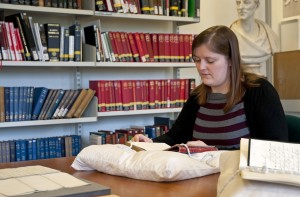March 15, 2012, by Kathryn Steenson
An Ancient Historian in the Archives
From May to November last year I was given the opportunity to conduct some research in the Manuscripts and Special Collections on behalf of the University’s Gender Histories Network. My task was to identify key areas within the collections that would be of interest to those researching topics related to the study of women and gender. Coming from a classical background (my PhD on Roman representations of female suicide was passed in December) I was a little apprehensive about the prospect of looking at material that was relatively ‘modern’ and not in a printed form (reading actual handwriting took some getting used to at first!). However, I was keen to study women and gender in different periods and contexts and I was not to be disappointed. The staff were all friendly and helpful, and any material I wanted to look at appeared almost as soon as it was ordered.

Ellie Glendinning examines historical documents in the Reading Room, Manuscripts & Special Collections
I examined material ranging from the private letters of an 18th century duchess, to the correspondence of a woman who worked for the BBC during the Second World War, and much in-between. One particularly notable find was the letters of the Chaworth-Muster sisters, Elsie, Rita, Ruth and Lina, dating to 1909-1915. Their correspondence, alongside that of their seven brothers (six of whom fought during the First World War), would be highly interesting and informative to any historian of this period. We are given glimpses of their relatively privileged and happy lives before the war (for example travels around Europe), and then witness how the war changed the lives of all the family (for example Lina takes over the running of the estate when her husband leaves). I hope that anybody wishing to learn more about historical female figures, particularly from the last three or four centuries, will visit the archives and take advantage of the rich and diverse material on offer there. I enjoyed my time researching there and would heartily recommend it to anyone!
– Guest post by Ellie Glendinning
Ellie Glendinning was awarded her PhD in Classics from the University of Nottingham in December 2011 (title, ‘Guilt, Redemption and Reception: Representing Roman Female Suicide’). Her primary research interests are in the roles and representations of women in ancient Rome, particularly as portrayed by elite male writers. Ellie worked on the project in the University of Nottingham’s Manuscripts and Special Collections on behalf of the University’s Gender Histories Network from May to November 2011. The aims of the project were to identify key collections that would be of interest to those researching topics related to the study of women and gender. Ellie is currently a teaching assistant in the University’s Department of Classics.
No comments yet, fill out a comment to be the first

Leave a Reply